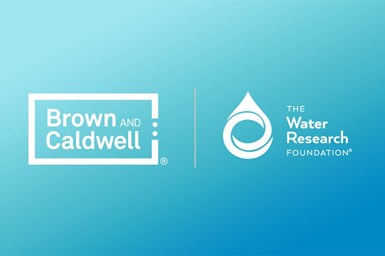Acid+ Wastewater Research Project Receives Grant
The Acid+ Digestion project is an applied research study to optimize acid gas digestion and test a novel process to benefit wastewater treatment and downstream waterways.
The Water Research Foundation (WRF) has granted $70,000 for the Acid+ Digestion project, an applied research study to optimize acid gas digestion and test a novel process to benefit wastewater treatment and downstream waterways.
The Acid+ process recirculates wastewater sludge from methane-phase to acid-phase digesters, potentially accelerating and intensifying digestion capacity by 50%. Subsequently, improved production and quality of biosolids and biogas are produced, requiring less digestion volume.
Additionally, Acid+ has the potential to achieve cost-effective nutrient recovery while reducing operations and maintenance (O&M) costs with simple retrofits to existing tankage and equipment to protect from struvite fouling. Struvite, a compound that forms when magnesium encounters nitrogen and phosphorus under increasing pH conditions, can degrade pipes to the point of requiring full replacement to restore capacity. When harvested, struvite can be sold as fertilizer, reducing biosolids phosphorus concentration by half and turning an O&M nuisance into a revenue stream. Concurrently, enhancing nutrient recovery yields cleaner, regulatory-compliant water for environmentally safe release to downstream waterways.
The $210,000 project is partly funded by WRF’s Tailored Collaboration and contributions from supporting utilities. Led by a research team of Chris Muller (Brown and Caldwell), Chul Park (University of Massachusetts Amherst) and John Fillos (City College of New York), optimized acid-gas and Acid+ processes will run in separate laboratory-scale experiments with conventional methane digestion as a control. The research will explore the benefits of retrofitting processes upstream of existing methane digesters to achieve lower O&M costs, higher-quality biosolids and biogas products, and cost-effective nutrient recovery.
The project is sponsored by the City of Columbus, which has successfully implemented acid phase digestion improvements at its Southerly Wastewater Treatment Plant, reportedly saving the city upward of $1M annually. Support includes contributions from the New York City Department of Environmental Protection, Gwinnett County/The Water Tower and the Metropolitan Sewer District of Greater Cincinnati.
Following a 21-month research process, a final report with Acid+ recommendations will be made available for industry dissemination.
Related Content
-
Alkaline Cleaning Guide
Gregg Sanko, Senior Chemist, Oakite Products, Inc. provides an overview of the alkaline cleaning process.
-
Solvent Versus Aqueous: Busting the Myths
Is aqueous cleaning “greener” than solvent cleaning? Is solvent a more effective cleaner than aqueous? These and many other questions are answered here to debunk the misconceptions that many manufacturers have held onto for years.
-
Replacing Open-Top Vapor Degreasing in Aerospace Manufacturing
Options and considerations for cleaning aerospace parts as regulations tighten on vapor degreasing solvents.

















